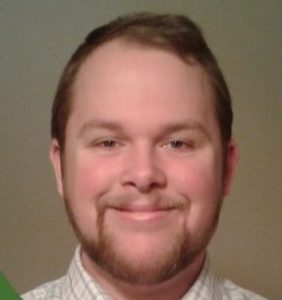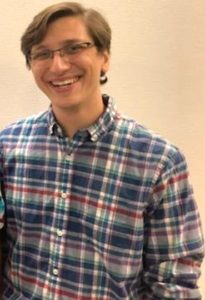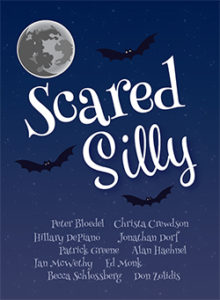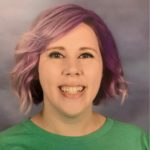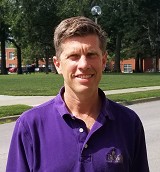Joseph Baldwin Academy
2025 JBA Courses
JBA Session I:
June 7-27, 2025
In a world of binge-watching shows on Netflix, curated Spotify playlists, and viral TikTok trends, our relationship with pop culture has never been so tangible. In this class, we will look at popular film, literature, and music from the American past and consider it through the eyes of historians.
What can we learn about society, cultural movements and communities through this lens? We will engage with topics such as Science Fiction and Visions of the American Future, Cowboys and the Mythologizing of the American Past, Popular Music and Social Movements, and so much more! Your recommendation algorithms will never be the same!
Instructor
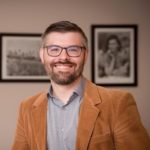 Professor Matthew Kennedy, Lecturer, Truman State University; Instructor of History, Kirksville High School, teaching Dual Credit US History and several electives in American History. He is also an instructor in the Education Department with Truman State University working with future Social Studies teachers.
Professor Matthew Kennedy, Lecturer, Truman State University; Instructor of History, Kirksville High School, teaching Dual Credit US History and several electives in American History. He is also an instructor in the Education Department with Truman State University working with future Social Studies teachers.
B.S., History; M.A.E. History/Social Science, Truman State University
Even though human civilization has only been around for roughly 5000 years, most historical studies focus exclusively on this period, ignoring the 13 billion years that led up to it. In this course, we will widen the scope of history to include the complete timeline, analyzing and exploring how the momentous events that took place before the earliest humans have shaped our development as a species. With a focus on the crucial historical thresholds that transformed humans and society, we will construct a more complete history of humanity.
Using David Christian’s Maps of Time as a guide, we will incorporate astronomy, biology, geology, and environmental science to develop a more complete account of history and humanity’s place in it. We will challenge common misconceptions of cause and effect in history, provoking students to look at human history with a more critical lens. In doing so, students will be better equipped to understand modern society as it stands today by having a fuller appreciation of the colossal forces that have and continue to impact our daily lives in countless ways. To achieve this goal, course activities will include reading, writing, discussion, and research into a wide array of topics.
Instructor
Professor Andrew Peake, Truman State University Visiting Faculty
B.A. History, M.A.E. History/Social Science, Truman State University.
Professor Peake was the 2018-2019 Director of the Joseph Baldwin Academy, a former high school social studies teacher and now is an Associate Software Developer, Federal Reserve Bank of St. Louis.
Students will be exposed to the diversity of fascinating organisms of the world, with special emphasis on those species that inhabit Missouri. We will interact with and learn about soils, plants, fungi, reptiles and amphibians, mammals, and birds. Through a combination of classroom, laboratory, and field activities we will examine in depth information about these amazing creatures. Students will learn how to investigate these organisms in a mixture of habitats, including ponds and streams, grasslands, and forests. Through interactions with live specimens and some preserved museum specimens, students will learn how to identify various groups of organisms from around the world and those species which occur in Missouri. Students will also learn about some of the similarities and differences in the anatomy and physiology of these critters. If you want to learn what organisms do and how they live, then this course is for you. We will be spending at least part of almost every day outside, so be willing and excited about getting your hands dirty.
Instructors
Dr. Chad E. Montgomery, Professor of Biology, Truman State University
B.S., Truman State University; M.A., University of Northern Colorado; Ph.D., University of Arkansas
Dr. Montgomery has studied clinal variation in Texas horned lizards, studied the effects of foraging mode on life history in copperheads and timber rattlesnakes, and then in Panama, as part of his postdoctoral work, examined the effects of amphibian decline on snake communities. Dr. Montgomery still conducts research in Central America, including a project examining body size variation in boa constrictors on islands off of the north coast of Honduras. Dr. Montgomery travels extensively throughout Central America and when back in the U.S. enjoys spending time with his family in St. Louis.
Dr. Bob Johnson, Assistant Professor of Agricultural Science, Truman State University.
Dr. Bob received a B.S. in soils, environmental and atmospheric science from the University of Missouri, Columbia and shortly thereafter cofounded the Columbia Center for Urban Agriculture. He went on to graduate school at the University of California, Davis completing an M.S. in Horticulture and Agronomy from in 2014 and a Ph.D. in Plant Pathology in 2020. He teaches classes in Soils and Plants among others. His research focuses on mycology and diversified farming practices.
Why is the sky blue? How do rainbows form? How do our eyes perceive the world? How does your phone display images? Why can you see yourself in a mirror? What’s happening with the iconic prism on The Dark Side of the Moon album cover? In this course, equipped with lenses, mirrors, prisms, and various light sources, we’ll develop three models of light to explain these phenomena and more. By the end, you’ll gain a deep understanding of light and its role in shaping our world. Expect hands-on exploration—and lasers. You’ll never see light the same way again.
Instructors
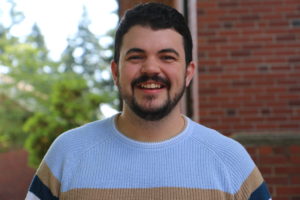
Joe Milliano, STEM Virtual Teacher Mentor Truman State University, Physics Instructor, The Lakeside School in Seattle, WA, former University of Missouri faculty with Missouri Scholars Academy (2019-2024)
B.A., Physics, B.S, Mathematics, Truman State University
M.S., Physics, University of Missouri, St. Louis
Professor Milliano has been a member of the JBA Faculty in 2021, 2022, and 2025. He is a dedicated physics and science educator who is passionate about making high-quality science education accessible to all students. During the school year, Professor Milliano teaches physics at The Lakeside School in Seattle, WA, and spends his summers instructing at summer academies such as Mizzou’s Missouri Scholars Academy and the Truman State University’s Joseph Baldwin Academy. Outside the classroom, he enjoys tap dancing, hiking, board games, and rewatching his favorite TV shows.
“Fan fiction is a way of the culture repairing the damage done in a system where contemporary myths are owned by corporations instead of owned by the folk (1997)”—Dr. Henry Jenkins, Director of Media Studies at MIT
The term “fan-fiction” refers to stories created by mostly amateur, unpaid writers who have taken inspiration from someone else’s characters, plot lines, and/or world. Fan-fiction includes lots of subcategories, so there is lots of variety!
Throughout the first week of this course, we will explore fan-fiction through a rhetorical lens by analyzing audience (fandoms) and the various ways language is used to appeal to those audiences. The second week will focus on many of the literary theories that underpin much fan-fiction writing, including postmodernism, poststructuralism, deconstruction, and various critical theories. Finally in the third week we will put our knowledge of various fandoms and literary theories into practice by producing some of our own fan-fictions!
WHY FAN-FICTION IS WORTH STUDYING
Here are three good reasons to study fan-fiction, just to get us started:
- Fan-fiction is super democratic. Anyone who wants to participate in a fan-fiction community can find a space where they are welcome and supported by other fans.
- Reading fan-fiction can teach us a lot about what readers pick up on and care about when reading or watching their favorite stories.
- The best fan-fiction often reflects some deep literary/media analysis, because to write a story your fellow fans will love, you have to understand the source material (and your audience)!
Instructor
Dr. Connor Maguire, Truman State University Visiting Faculty
Dr. Maguire was the 2021 and 2022 Director of the Joseph Baldwin Academy. He is currently an ELA and AP Educator in the Saint Louis Public School District. Dr. Maguire holds a B.A. in Sociology and English, and an M.A.E. in Secondary Education and M.A. in English from Truman State University. He also has a Ph.D. in Education from the University of Missouri – St. Louis with a focus on social justice in schools.
Explore how the computer has been integrated into the image-making processes by incorporating traditional art processes, such as drawing and markers, with modern Graphic Design software. Learn how professional artists, designers, and illustrators use the power of Adobe Photoshop, Adobe Illustrator, and other software to create digital artwork and enhance images to create digital graphics such as maps, posters, and postcards.
The basic features of Adobe Photoshop and Illustrator will be explored through tutorials and original artwork will be produced when techniques are mastered. By the end of the course, you will have a digital and print portfolio consisting of several projects. You will also use digital cameras, scanners, and output to laser/inkjet printers. Quad-Core Intel Macintosh computers (the industry standard platform) power this exploration into the realm of digital imagery.
Instructor
 Professor Matthew Derezinski, Professor of Art, Design Program, Truman State University
Professor Matthew Derezinski, Professor of Art, Design Program, Truman State University
B.F.A., Visual Communications, Kansas State University; M.F.A., Visual Communications, Kansas State University
From Page to Stage is an introduction to the world of theatre. You will explore the many different areas of theatre from theatre history to stage makeup, all while rehearsing for a production to be performed at the end of the three weeks.
While you do not need prior experience, you do need to have an open mind and the willingness to “put yourself out there.” If you would rather have backstage experience instead of onstage, there will be technical roles available for the production.
2025 JBA Play will be: “Scared Silly” This play tasked ten playwrights with the challenge to bring their funniest takes on the fearsome in this collection of ten-minute plays. Designed to be flexible for your evil plans, these plays can be performed in any combination. Every spooky tale in this collection has a twist, whether it’s what detention looks like in a school for the supernatural (The Midnight Club), what happens when a slasher-movie junkie tries to track down a killer (It’s You!), the incredible secret of the trick-or-treater dressed normally who wants candy anyway (The True Meaning of Halloween), or the only thing that scares ghosts (In the Waiting Room at the Ghost Placement Agency).
2025 JBA Play
Instructors
B.A., Theatre, Truman State University; M.A.T., Educational Theory, University of Central Missouri
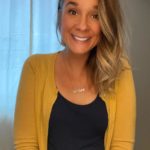
B.A., Theatre and English, Truman State University; M.A.E., Secondary English, Truman State University
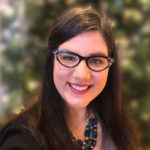
This course is designed to introduce you to the benefits of exercise, engage in fitness testing, develop methods of exercise prescription using the FITT principle, all while taking a look at personal health and wellness. Students engage in many types of cardio fitness, dance, and movement followed by learning about the science of exercise, including the health-related physical fitness components. In addition, we will examine the nutritional aspects of healthy eating using the MyPlate representation, understanding how to read food labels, and why hydration is important for health. You will also discover the historical background and social impact that movement and dance have made on people throughout the world, as well as learning to lead and choreograph for exercise and dance. Overall, you will develop a greater appreciation for implementing behaviors that affect your health in a positive way to improve your physical, emotional, social, spiritual, and intellectual well-being.
Instructor
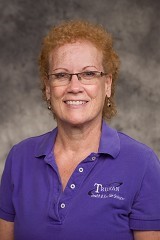 Professor Melody Jennings, Instructor in the Health and Exercise Sciences, Truman State University
Professor Melody Jennings, Instructor in the Health and Exercise Sciences, Truman State University
Professor Jennings also owns and operates Melody’s School of Dance and Tumbling in Kirksville, Mo.
B.S., Physical Education, Truman State University; M.A., Teaching of Physical Education, Truman State University
Through a variety of collaborative outdoor activities, you will build leadership skills and increase levels of personal and social confidence through group problem-solving and teambuilders. This class will include a balance of classroom preparation and physical activity in outdoor settings with an emphasis on positive, inclusive practices. Learning experiences may include hiking, canoeing, outdoor cooking, fishing, outdoor games, archery, and geocaching.
Instructor
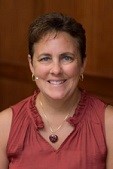 Dr. Julene Ensign, Truman State University Department Chair, Associate Professor of Exercise Science
Dr. Julene Ensign, Truman State University Department Chair, Associate Professor of Exercise Science
M.A.E., Physical Education; B.S., in Kinesiology, University of Illinois; M.S., Therapeutic Kinesiology, University of Illinois; Ph.D., Kinesiology Pedagogy, University of Illinois
Have you ever wondered why people respond so strongly to music? Or what’s going on in your brain when doing/listening to music?
The Psychology of Music is an introduction to how we understand and perceive music and how and why we respond to it. You do not need a background in reading music for this class. You’ll start with building a base of knowledge of musical acoustics and the anatomy/physiology of the ear and the brain. Then you will study how we perceive music; how we learn music; how we understand “meaning” in music; and how music is significant in our lives. During the course, you will listen to all kinds of music, watch videos and movies to see how music is used to guide our emotional response, and even do some “musicking” of our own. When performance scheduling allows with the Kansas City Symphony, this class will take an overnight field trip to Kansas City, Missouri.
Instructor
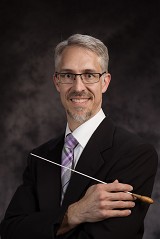 Mark Jennings, Professor of Music and Director of Choral Activities at Truman State University. At Truman, he conducts the university choirs, including Cantoria, University Chorus, and Voci chamber ensemble. He also teaches courses in choral music, applied voice lessons, and conducting, and he leads the master’s program in choral conducting. Ph.D. in Music Education/Choral Music from the Florida State University, studying with Andre Thomas and Rodney Eichenberger, his master’s degree in choral conducting is from Michigan State University, and his bachelor’s degree is from St. Olaf College.
Mark Jennings, Professor of Music and Director of Choral Activities at Truman State University. At Truman, he conducts the university choirs, including Cantoria, University Chorus, and Voci chamber ensemble. He also teaches courses in choral music, applied voice lessons, and conducting, and he leads the master’s program in choral conducting. Ph.D. in Music Education/Choral Music from the Florida State University, studying with Andre Thomas and Rodney Eichenberger, his master’s degree in choral conducting is from Michigan State University, and his bachelor’s degree is from St. Olaf College.
In his book Understanding Comics Scott McCloud explains that the potential of comics is limitless, but has been constrained by its perception in popular culture. In this course we will explore the true potential of the medium by reading and analyzing comics (also known as graphic novels) as a form of both art and literature. Using McCloud’s Understanding Comics as a guiding text we will learn about the history of comics as well as ways to interpret the combinations of words and pictures within comics. We will put our understanding of sequential art into conversation with other mediums that use words and pictures to make meaning such as advertisements, art, and film. This course will also invite students to think critically about what they read and to consider the ability of literature to shape our understanding of who we are and how we interpret the world around us.
Daily activities will include reading, writing, and discussion. While we may try our hand at producing some comics ourselves, artistic ability is not a requirement for this course.
Instructor
Rachel Brown, Instructor of English, Raytown High School, Truman State University Visiting Faculty
B.A. English, Truman State University; M.A.E. English, Truman State University.
Course Description: Plein air painting is the practice of creating observational works of art on-site. During this course, students will gain the technical proficiency necessary to create on-site watercolor paintings. The skill of visually capturing the surrounding environment is a tool that benefits many visual careers. Additionally, trips to paint on-site at various Kirksville landmarks such as downtown and the Missouri Department of Conservation will enrich student’s art practice.
Instructor
Megan Hines, Instructor of Art, Kirksville High School, Truman State University Visiting Faculty
M.A. Art Education, Boston University, Boston MA; B.A. Studio Art, Graceland University, Lamoni, IA
Professor Megan Hines will be joining JBA as faculty for this course. Students will have the same course content and experience that has been previously described by Professor Dunnagan.
Professor Hines is a Missouri Art Education Association council member, having also exhibited and won several awards. She has been selected as the Missouri Secondary Art Educator of the Year and presents at state art education conferences annually. With a BA in studio art, her concentration was in painting and photography. Recently, she has been working in fibers and has been the recipient of numerous other awards and juried exhibits. Prior to working in the Kirksville community, Professor Hines has served as an adjunct art instructor for Graceland University, Indian Hills Community College, and North Central Missouri College.
JBA Session II:
July 5-25, 2025
Are you interested in traveling to the Spanish-speaking world? Do you enjoy exploring museums, visiting touristic sites, trying new foods, and watching cortometrajes? Are you interested in participating in an immersive experience? If so, this class is for you!
In this course, we will explore three Spanish-speaking countries: Colombia, Mexico, and Puerto Rico through the lens of food, artisanal crafts, tourist attractions, and methods of transportation. Students will explore famous sites in each country, read schedules for the metro and buses for each, read reviews to find lodging, learn how to regatear (bargain) in markets, order street food, and create their own trip to a particular destination in one of these countries of focus. In class activities, students will listen to music, watch videos, read infographics, reviews, and articles, as well as participate in interpersonal activities such as information-gaps. Students will also create posters, Flipgrids, podcasts, and presentations in Spanish. At the end of each week, students will present on one tourist site, a type of transport, or a famous dish to conclude our exploration of that country.
This course is designed for beginners and/or students with some previous Spanish knowledge (does not need to be extensive). This course will focus on learning vocabulary related to food, transportation, activities, lodging, wants and needs, expressing likes and dislikes, telling someone where they are going, telling time, describing different destinations, and comparing options in Spanish. As a culminating project, students will present and create a trip with a budget of $5,000 to one of these three countries. Students will include food, activities, transportation, and lodging in their proposal, along with other necessities.
Instructor
 Professor Kathleen Placke, Spanish Educator, Foreign Language Association of Missouri Early Career Educator Award Recipient, Ritenour High School, Truman State University Visiting Faculty
Professor Kathleen Placke, Spanish Educator, Foreign Language Association of Missouri Early Career Educator Award Recipient, Ritenour High School, Truman State University Visiting Faculty
B.A., Modern Languages, Concentration in Spanish, Truman State University; M.AE., Foreign Languages, Spanish, Truman State University
In a culture of 24-hour news, larger-than-life pundits, and a blurring of the line between news and commentary, rhetoric and argumentation are a way of life in modern America. Argument now occurs in settings such as the halls of Congress, evening news talk shows, popular sports programming, and local city councils. Advocacy, in the form of advertising, is everywhere. As consumers of media and participants in an increasingly adversarial culture, learning the critical principles and practices of advocacy and persuasion provides a basis for informed involvement in the world around us.
This course uses a perspective rooted in classical rhetorical theory as a mode of critical thinking and public involvement to study the processes of argumentation and persuasion in various interpersonal, political, academic and pop culture settings. You will begin by engaging theories rooted in the classical rhetoric of the Greeks and Romans and evolve through contemporary models of argument. As a complement to this discussion of argumentation theories, you will employ various models of debate as a means to practice the ideas they learn. You will engage in argument by participating in visual argument, in-class debates, political debates, and even humor to test your skills.
Finally, lessons learned in all settings will be used as a framework from which to engage political discourses and persuasive popular media campaigns.
Instructor
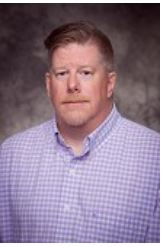 Dr. Jay Self, Professor of Communication, Chair of Department of English, Truman State University.
Dr. Jay Self, Professor of Communication, Chair of Department of English, Truman State University.
B.A., Communication, Truman State University; M.S. Communication in Human Relations, Texas Christian University; Ph.D. Communication Studies, University of Kansas
An Animated Course is an introduction and exploration of traditional cell frame animation. Drawing and sketching skills are recommended. Fundamentals of cartooning, character development and storyboarding will be explored and experienced. Stop-motion photographic and claymation animation techniques are also topics for this course. Students will use their cellphones with free apps to create animations and to complete audio and video post-processing.
The class will be watching a documentary movie about animator Chuck Jones and his long career animating Loony Tunes characters for Warner Brothers. Chuck will impart vital animation tips and secrets. Yes, we will watch classic cartoons in addition to viewing the summer’s best animation offering at the local theater. Students should be confident in drawing and/or interested in making their drawings and characters come to life.
Instructor
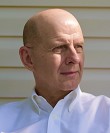 Professor Rusty Nelson, Professor of Art, Design Program, Truman State University
Professor Rusty Nelson, Professor of Art, Design Program, Truman State University
B.F.A., Fort Hays State University; M.F.A., Kansas State University
Prior to higher education, Nelson worked professionally in advertising for fifteen years in Topeka, Kansas City, and Salina, Kansas. His career encompasses multiple areas of experience from advertising and publication design, corporate identity, outdoor billboard and signage design, book design and traditional and digital illustration. Nelson’s illustrations have been published in regional and national publications such as Field and Stream, Discipleship Journal and Mature Living. Related areas of interest include micro-publishing and bookbinding as well as mural design and production. Technical areas of experience include traditional paste-up, marker comps, type specifying, pre-press offset lithography production as well as digital applications of Photoshop, Illustrator, InDesign and Dreamweaver.
The course will introduce you to the scientific process by exploring fundamental concepts in chemistry in the context of contemporary environmental and societal issues. A broad range of topics will be explored throughout the session, including the atom and atomic structure, molecules and chemical bonding, chemical nomenclature, writing and balancing chemical equations, the mole and molarity, and the relationship between chemical structure and function. You will participate in several laboratory experiences in which you will learn to work safely in the laboratory and make careful observations of chemical reactions and phenomena in order to draw useful conclusions from your experiments. You will also have the opportunity to explore and share new topics through brief class presentations.
A key component of the course involves inquiry based learning as a means to understand the process by which new scientific knowledge is developed. For example, in the laboratory, you will synthesize a compound of unknown composition and use a variety of tools to deduce the structure of this new material. Examples of other experiments include determination of water hardness of samples from local sources, the synthesis and analysis of biodiesel, chromatographic characterization of chemical mixtures, analysis of artificial blood, the study of dyes through the making of tie dye T-shirts, as well as the opportunity to develop and perform chemical demonstrations for your peers.
Instructor
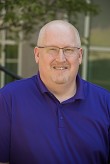 Dr. Brian Lamp, Professor and Chair of Chemistry, Truman State University
Dr. Brian Lamp, Professor and Chair of Chemistry, Truman State University
B.A., Augustana University (SD); Ph.D., Analytical Chemistry, Iowa State University
How do film composers influence the audience’s emotional response and in what ways do they create music that elicits a particular location or time period? How do they balance the music with dialogue? In this course, you will investigate the development of movie music from the early improvised organ playing of musicians like Fats Waller for silent films to more recent music from the biggest composers in Hollywood, including Erich Korngold, Max Steiner, Henry Mancini, Bernard Herrmann, John Williams, Hans Zimmer, Danny Elfman, James Horner, Alan Silvestri, Randy Newman, Rachel Portman, and Howard Shore.
You will investigate how the specific musical elements of melody, harmony, counterpoint, tempo, rhythm, and orchestration can be used to enhance scenes that deal with themes such as romance, sadness, chase, horror, magic, and fantasy.
As a final project, you will create your own soundtrack to an original movie that you record throughout the session and make an original board game of film music trivia. Field trips will be taken to the Kirksville movie theater for a class screening of a new release and to the Truman television/radio station for a tour of the media equipment.
Instructor
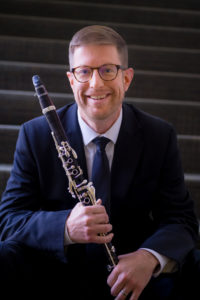 Dr. Jesse Krebs, Professor of Music, Clarinet, Truman State University
Dr. Jesse Krebs, Professor of Music, Clarinet, Truman State University
Krebs has performed guest recitals in Costa Rica, England, Thailand, Ireland, and throughout the United States. He joined the music faculty at Truman State University in 2005. In addition to instructing the clarinet studio and directing the Truman Clarinet Choir, he teaches the Music and Political Protest Junior Interdisciplinary Seminar. Before coming to Kirksville, he was the Clarinet Instructor and the Director of Chamber Winds at Bainbridge College in Georgia, and he served on the summer faculty for the Cultural American Music Program in the Florida Keys. With colleague Dr. Xin Gao, he hosted the inaugural American Single Reed Summit at Truman in 2018. Dr. Krebs frequently performs as a substitute with the Kansas City Symphony and has been featured as a concerto soloist with the North Carolina, Central Florida, and Southeast Iowa Symphony Orchestras.
B.M.E., University of North Carolina at Greensboro; M.M., University of North Texas; D.M., Florida State University
Game Design and Theory is an introduction and exploration of not only board games but tabletop games of all types and the role these games play in our lives. This course will analyze game fundamentals, everything from dexterity to worker placement to abstract mechanisms.
We will examine the player experience with respect to choices and options on each turn, looking at how games abstract larger concepts, allowing players to experience situations never available to them in their everyday lives. We will move from modern classics like Catan and Carcassonne to tabletop RPGs like Dungeons and Dragons as we explore gaming possibilities.
The course will discuss game theory in terms of design approach, interaction of art and function, system probability, and cost-benefit analysis. The class will be playing games often, learning how different systems interact both on the game board but also around the table, as social interaction plays a large part in many tabletop games. The culminating project will be designing our own boardgames using the systems we’ve explored in class.
Instructor
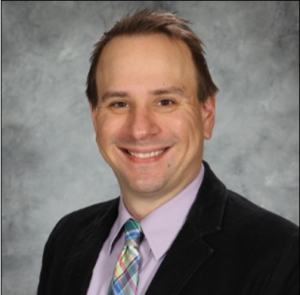 Professor James Miscavish, English, LEAD Innovation Studio, Park Hill School District, Truman State University Visiting Faculty
Professor James Miscavish, English, LEAD Innovation Studio, Park Hill School District, Truman State University Visiting Faculty
B.S. E.d., University of Missouri, Columbia; M.S. E.d., Northwest Missouri State University; National Board Certified Teacher
Did you know you are 50% genetically similar to a banana? All living organisms from the simplest bacteria to more complex organisms like humans use the same genetic material to pass on their traits – DNA. DNA is the molecule of life. But what exactly is DNA and how does it make you, you and a fly a fly?
In this course you will learn the basics of DNA and heredity, and then dive deeper to understand how DNA is used to create a fully functional organism. We will also explore new technologies in DNA editing that are making our hopes of changing disease-causing mutations in DNA a reality. We will discuss the science behind these techniques and then discuss some of the ethical and moral issues they raise. Finally, we will investigate the ethics and laws surrounding genetics such as do you own your own genes, who is allowed to have access to your genetic code, and what are your legal rights concerning your genetics?
Our learning in the classroom will be supplemented by many activities in the lab. We will learn about and use many biotech tools and molecular genetic techniques. Activities will include extracting DNA from strawberries, genetically modifying bacteria, and investigating your own genetics to name a few!
Instructor
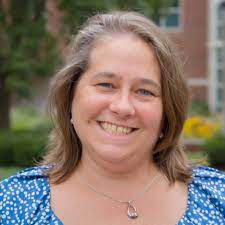 Dr. Sarah Berke, Assistant Professor of Biology, Biology Department, Truman State University.
Dr. Sarah Berke, Assistant Professor of Biology, Biology Department, Truman State University.
B.A., Biology and Psychology, Augustana College, Rock Island, Ill.; Ph.D., Neuroscience, University of Iowa, Iowa City, Iowa
This course introduces you to the world of business through management, marketing, finance, accounting, and entrepreneurship. You will learn what is needed to operate a business and gain valuable skills, such as teamwork and problem-solving. You will also learn key business concepts and use real-world tools, observe their practice in the field, and apply them through teamwork and organizing a business. In addition, you will learn valuable personal financial skills.
Instructor
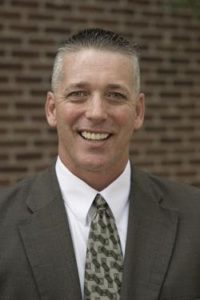 Professor Jim Bergman, Instructor of Business Administration, Truman State University
Professor Jim Bergman, Instructor of Business Administration, Truman State University
B.S., Business Administration, Truman State University; M.B.A., William Woods University
They are some of the earliest and greatest stories of all time. They’ve been sung by bards, told around campfires, echoed through marble halls, set to music, and accompanied by popcorn in modern movie theaters.
In this course we will ask: What is mythology?
What are the stories that comprise Greek and Roman, Nordic, Mayan, and other world mythologies? Why were they significant and why do we keep telling them? We will read and compare creation myths, divine pantheons, hero myths, and modern retellings of ancient mythology using a variety of critical lenses.
Students will draft a fantasy team of gods, heroes, and creatures to compete in an Olympic Fantasy League, work together to solve puzzles in a mythology escape room, create movie trailer-like skits, and learn to tie a toga, all while studying some of the world’s greatest literature.
Instructor
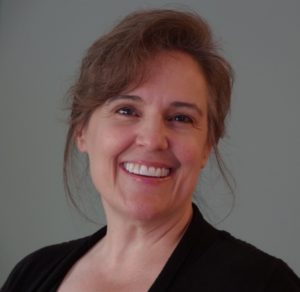 Professor Wendy Doman, English/Spanish Teacher, Kirksville High School, former adjunct English MACC, former consultant Truman State University
Professor Wendy Doman, English/Spanish Teacher, Kirksville High School, former adjunct English MACC, former consultant Truman State University
B.A. English, Brigham Young University; M.A. English University of Kansas
Neurobiology’s model organisms (mice, worms, flies) will frame our discussion of what a neuron is and what nervous systems can do.
In this lab course, you’ll be scientists exploring how the nervous system helps us move, think, and feel. You’ll get to see neurons ‘talk’ to each other, learn to make hypotheses about how that happens, and your most definitely figure out how to test your hypotheses with near state of the art physiology experiments. Basically, you’ll be doing the same work as professional scientists!
All of your experiments will be on each other or on worms and flies. Neurobiologists use a variety of organisms to understand the biology of the brain. You see, all nervous systems are similar and each organism provides advantages for answer particular neurobiological questions.
You only have 3 main jobs: pay attention, ask questions, and have fun!
One last note: this lab has LOTS of information that may be new to you. Don’t worry! We will go over everything in class. On day one, you’ll get a copy of a lab book with basic information about our experiments.
Instructor
 Dr. Brett Berke, Associate Professor of Biology, Truman State University
Dr. Brett Berke, Associate Professor of Biology, Truman State University
B.S., Electrical Engineering, University of Illinois, Urbana-Champaign; Ph.D., Neuroscience, University of Iowa; Post-Doctoral Fellowship, Yale University
Can you keep a secret a secret?
Suppose you need to get an important message to your best friend Remington, but you are afraid that your arch-nemesis, Sly (a master of cryptanalysis!) might try to intercept the message and read it for his own evil purposes. How can you encode your message so that Sly will not be able to decipher it? What if you need to establish communications with your ally Natasha, and the only channel of communication available is one that can be accessed by anyone. How can you agree, out in the open, on a procedure for Natasha to encipher her message, which will permit only you to decipher it?
In this course we will study the mathematics of cryptology as we look at the most famous methods of encryption dating back two thousand years to the age of Caesar right up through high-tech applications for securing communication on the internet. Students will have opportunities to make and break many of the codes we study. We will discuss dramatic historical events in which cryptography played a key role, including the breaking of the German Enigma code in World War II. Along the way we will see how methods of cryptanalysis were used to interpret Egyptian hieroglyphics, and we will study unusual methods of encryption, such as the use of the Navajo language during World War II. We also peer into the future and contemplate what impact quantum computers will have on our ability to keep our communications secret.
Instructor
Dr. Tony Vazzana, Associate Professor of Mathematics, Truman State University. B.S., University of Notre Dame; M.S., Ph.D., University of Michigan, Ann Arbor.
The human body is the most amazing machine on the planet. This course is designed to teach students about the human body and how to assess and improve human performance. Topics in this course will include strength and conditioning, anatomy, nutrition, sports psychology, training principles, hydration, supplements, wearable technology, injury prevention & risk management. How can we develop programs that consider the nature of the sport and athletes? What are the best practices and strategies to ensure optimal performance outcomes?
Instructor
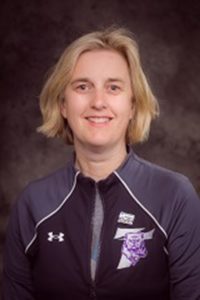 Professor Jorn is from just south of London, England and was originally recruited to Truman as a student to run track and cross country. Now, Professor Liz Jorn is a member of the Health and Exercise Sciences faculty since the fall of 2000. She is the faculty advisor for Cardinal Key National Honor Society, Student Athlete Advisory Committee and students pursuing the Sport and Recreation Management concentration, while also being actively involved in the planning and supervision of the internship/practicum program for Exercise Science. In addition to her roles on campus, Professor Jorn is also the Faculty Athletics Representative representing Truman with the GLVC and NCAA, serving as the chair of the GLVC Steering Committee, and a member of the NCAA Academics Requirements Committee.
Professor Jorn is from just south of London, England and was originally recruited to Truman as a student to run track and cross country. Now, Professor Liz Jorn is a member of the Health and Exercise Sciences faculty since the fall of 2000. She is the faculty advisor for Cardinal Key National Honor Society, Student Athlete Advisory Committee and students pursuing the Sport and Recreation Management concentration, while also being actively involved in the planning and supervision of the internship/practicum program for Exercise Science. In addition to her roles on campus, Professor Jorn is also the Faculty Athletics Representative representing Truman with the GLVC and NCAA, serving as the chair of the GLVC Steering Committee, and a member of the NCAA Academics Requirements Committee.
MA in Education-Exercise Science, Truman State University
BS, Exercise Science, Truman State University
